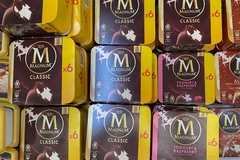
- Industry news
Industry news
- Category news
Category news
- Reports
- Key trends
- Multimedia
- Journal
- Events
- Suppliers
- Home
- Industry news
Industry news
- Category news
Category news
- Reports
- Key trends
- Multimedia
- Events
- Suppliers
FrieslandCampina Reports 30% Rise in Profit in H1

Profit for the first half of 2009 was up 30 percent, rising to 78 million euros thanks to an improved performance on finance income and costs, and share of profit of associates. Both branded products and industrial labels performed well.

01 Sep 2009 --- FrieslandCampina has reported that the first six months of 2009 were characterised by difficult economic conditions worldwide. Both selling prices and volumes of dairy products sold were being weighed down as a result. This led to a 15 percent drop in Royal FrieslandCampina's revenue to 4.1 billion euros. Operating profit fell 8 percent, landing at 110 million euros. Profit for the first half of 2009 was up 30 percent, rising to 78 million euros thanks to an improved performance on finance income and costs, and share of profit of associates. Both branded products and industrial labels performed well. Owing to disappointing selling prices of basic products, such as milk powders, caseins (milk protein) and cheese in particular, the milk price paid to dairy farmers has come under severe pressure. Due, in part, to this development, FrieslandCampina paid its member farmers a guaranteed price of 26.04 euros, exclusive of VAT, per 100 kilograms of milk for the first half of 2009. This represents a 32 percent drop compared with the same period last year.
Cees ’t Hart, Chief Executive Officer of Royal FrieslandCampina, described the first half-year earnings of the newly merged company as “encouraging, given the difficult dairy market”. However, at the same time he also noted that “the guaranteed milk price for our member dairy farmers is at a worryingly low level’’.
Says ’t Hart: “The half-year figures show a clear division between branded products and industrial specialties on the one hand, and basic products on the other. We managed to achieve good results, under the circumstances from both our branded products and our industrial specialties. Branded products showed a particularly positive trend in South East Asia and Africa, and we saw volumes grow and market share increase in most countries in these regions. In Europe we managed to improve our market position. We are particularly concerned about trends in prices for basic products such as milk powders, caseins and cheese. The selling prices for basic products such as milk powders, caseins and cheese are exceptionally low due to lagging demand. The price levels not only have a major impact on our results, they also determine to a significant extent the guaranteed price for our member dairy farmers.
In the first half of 2009, demand for dairy products from both consumers and industrial customers dropped further around the world due to the economic crisis, although there were differences between regions and product categories. In Europe, fewer dairy products were consumed and used, where Asia showed growth stagnation. The strong euro and the weak dollar got in the way of exports of dairy products outside the European Union (EU) because prices were high relative to price levels in other regions. Selling prices of milk powder, caseins and cheese were under heavy strain in the first half of 2009. This then had a gradual effect on price developments in other product categories as well. Supermarkets in Europe are again starting to focus on price competition, which is causing more and more pressure on selling prices of dairy products in the supermarket segment.
Revenue for the first half of 2009 came to 4.1 billion euros, down 714 million euros (15 percent) from the first half of 2008 (4.8 billion euros). The Consumer Products International business group (Asia, Africa, the Middle East, export) saw its revenue increase by 4 percent to 951 million euros, mainly as a result of volume growth. The other business groups experienced a drop in revenue. Consumer Products Europe recorded a fall in revenue by 18 percent to 1.4 billion euros because of lower selling prices and dropping demand, which led to lower volumes. Its market share did grow. Cheese & Butter saw its revenue drop by 20 percent to 1.0 billion euros. This was due to lower selling prices as well as to falling volumes of products sold, especially where cheese was concerned. Ingredients posted a drop in revenue by 16 percent to 593 million euros, which was primarily attributable to a sharp decrease in selling prices of basic products such as milk powder and caseins. Volumes of products sold increased in this business group because of higher production levels of low-fat milk powder due to a drop in demand for milk by other business groups and more milk supplied by member dairy farmers.
FrieslandCampina's operating profit was down 8 percent in the first half of 2009, dropping to 110 million euros (first half of 2008: 119 million euros). Operating profit as a percentage of revenue was 2.7 percent (first half of 2008: 2.5 percent).
Consumer Products International’s share in operating profit was particularly noteworthy. This business group managed to increase its operating profit by 97 million euros, lifting it to 135 million euros (first half of 2008: 38 million euros). Consumer Products Europe also delivered an excellent performance, recording a rise in operating profit to 109 million euros (first half of 2008: 72 million euros) thanks to cost control and cuts, and achievement of synergies. The drop in FrieslandCampina's earnings was due mainly to the decrease in operating profit at Ingredients, which went from an operating profit of 80 million euros in the first half of 2008 to an operating loss of - 45 million euros for the first six months of 2009. Cheese & Butter's posted an operating loss of - 55 million euros (first half of 2008: - 25 million euros). At both business groups, the drops were caused mostly by plummeting selling prices of products such as milk powder, caseins and cheese. Another factor that played a role was the lower valuation of inventories as a result of lower prices of raw materials and milk, and depressed selling prices. The results realised on the sales of Nijkerk Dairy B.V., the ice-cream activities in Romania and ingredients activities in Argentina had no material effect on results.
Operating expenses dropped 15 percent to 4.0 billion euros in the first half of 2009. A total of 1,182 million euros was distributed in milk payments, 30 percent less than in the same period of 2008. Non-recurring expense items include restructuring costs for an amount of 8 million euros, which comprise not only the restructuring costs associated with the merger, but also the costs of the announced closures of the facilities in Oud Gastel and Oldenzaal in 2010. Contrary to earlier announcements that the first concrete merger synergies were not expected until 2010, the first cost savings were already achieved in the first six months after the merger because measures were sped up. Lower purchase, staff and overhead costs were the result. The merger led to 150 redundancies in the Netherlands.
Finance income and costs, and share of profit of associates improved, rising 31 million euros from - 50 million euros to - 19 million euros. The drop in financial costs is largely attributable to lower dividend payments by DMV Fonterra Excipients. Another factor in the drop in finance costs was an increase in cash flows from operating activities, mostly as a result of lower working capital levels. A lower rate of interest was paid and share of profit of associates improved strongly.
The income tax expense stood at 13 million euros (first half of 2008: 9 million euros) owing to a better financial performance outside the Netherlands.
Profit for the first six months of 2009 came to 78 million euros. Despite the lower operating profit, this is 30 percent up from profit for the first half of 2008 (60 million euros), the most important reason for the improvement being a better performance on finance income and costs, and share of profit of associates.
Of profit for the period, an amount of 24 million euros is attributable to interest on member bond loans, 4 million euros to holders of perpetual notes, 22 million euros to minority interests and 28 million euros to Zuivelcoöperatie FrieslandCampina U.A., the equity holder.










